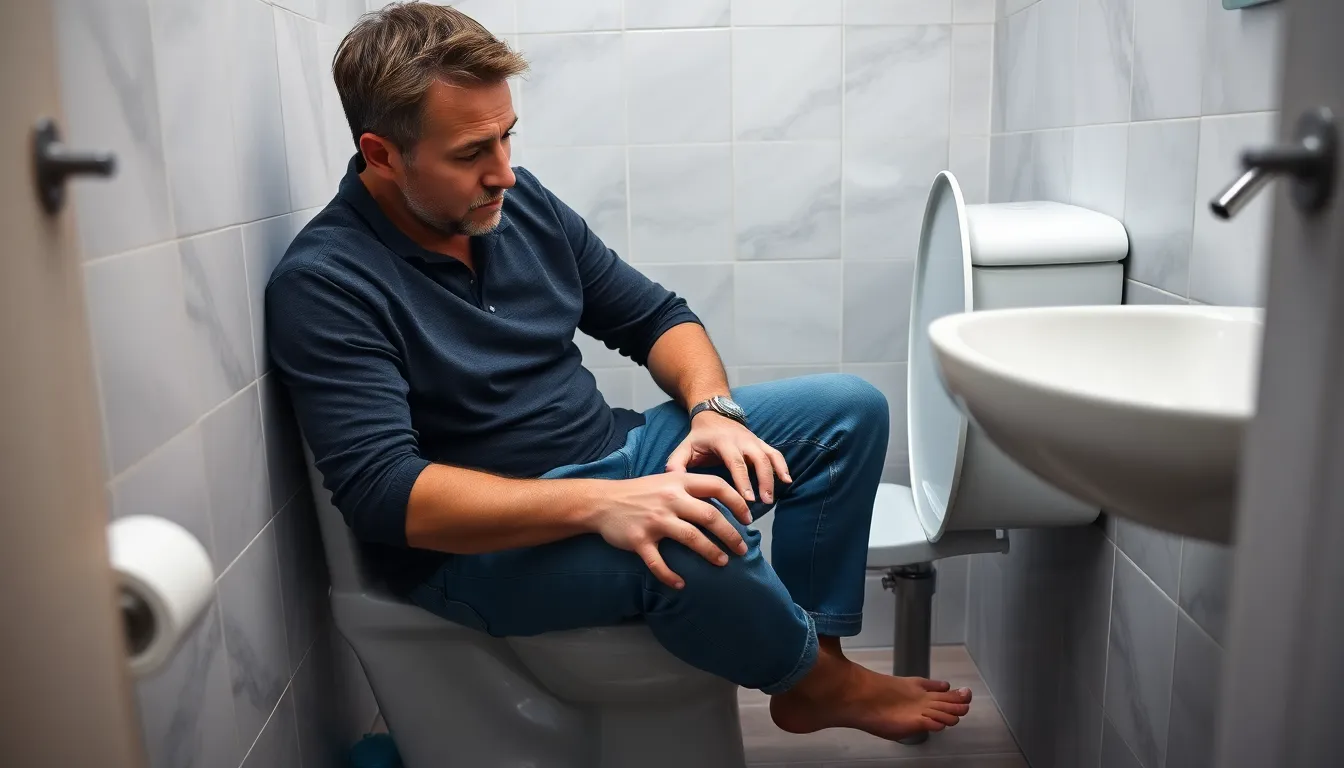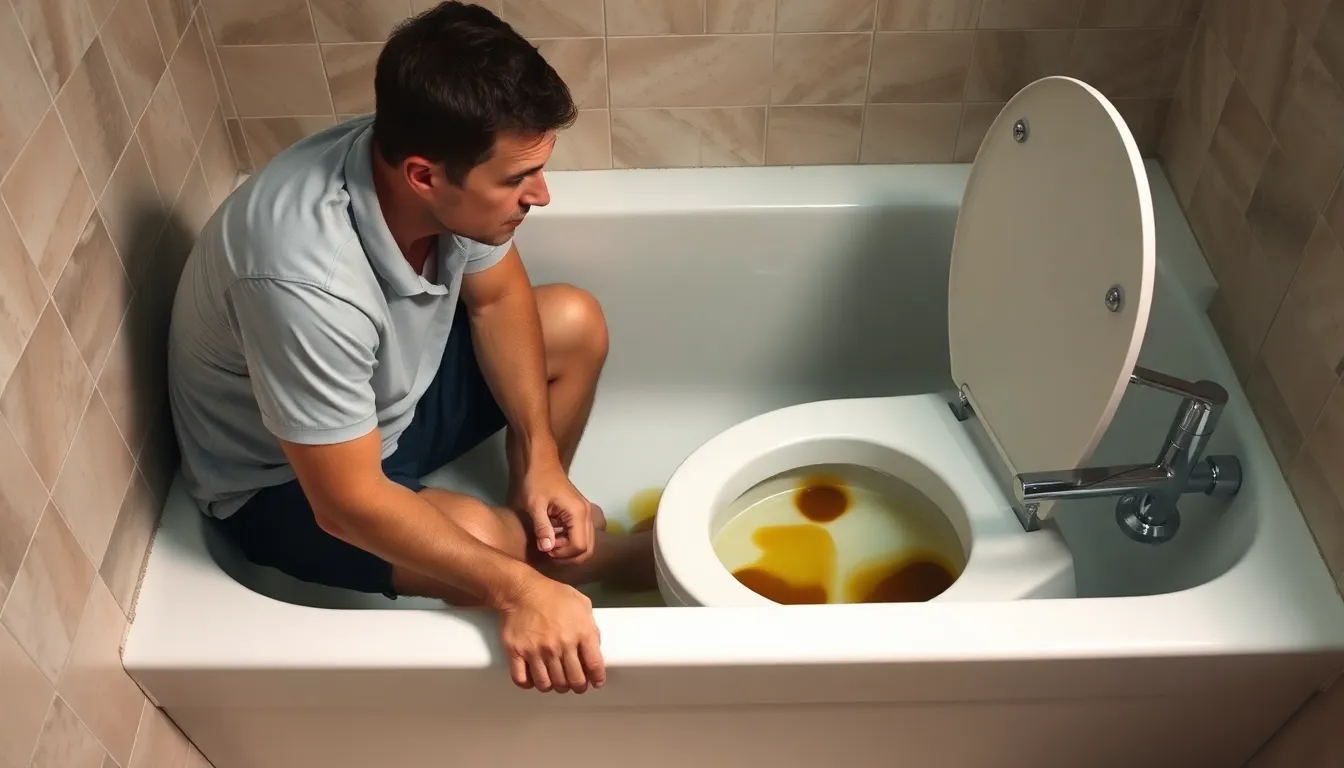Table of Contents
ToggleSeeing oil floating in the toilet alongside stool can be alarming and confusing. This unusual phenomenon often raises questions about health and plumbing issues. While it might seem like a minor inconvenience, it can signal underlying problems that shouldn’t be ignored.
Oil in the toilet could stem from various sources, including dietary choices or plumbing malfunctions. Understanding the causes can help individuals address the issue effectively. It’s essential to recognize the potential implications for both personal health and household plumbing to take appropriate action.
Understanding Oil Floating in Toilet With Stool
Oil floating in the toilet with stool indicates underlying issues that demand attention. Identifying common causes and recognizing accompanying signs can help in addressing these problems effectively.
Common Causes of Oil Presence
- Dietary Choices: High-fat diets, particularly those rich in oils, can lead to excessive fat in stool, causing oil to float. Foods such as fried items or processed snacks contribute significantly.
- Malabsorption Disorders: Conditions like celiac disease or pancreatitis impair the body’s ability to absorb fats, resulting in oily stools. In such cases, the digestive system fails to break down fats properly.
- Pancreatic Insufficiency: Insufficient production of digestive enzymes from the pancreas can lead to improper digestion of fats. This often causes oily floating stool due to unabsorbed fats.
- Infection: Certain infections, especially gastrointestinal ones, may lead to fat malabsorption. Bacterial overgrowth can interfere with nutrient absorption and cause oily stools.
- Cholestasis: A condition where bile flow is reduced or blocked leads to fat buildup in the digestive tract, resulting in oily stools. Conditions causing liver dysfunction can also contribute to this.
Signs to Look Out For
- Changes in Stool Color: Stools may appear pale or grayish, indicating a potential issue with fat absorption. Normal stool color changes should raise alarm.
- Unusual Odors: A foul smell or a particularly strong odor may accompany oily stools, suggesting malabsorption or infection. Monitoring odors can provide insights into digestive health.
- Abdominal Discomfort: Cramping or bloating often accompanies digestive issues. If oil appears with stool, these symptoms might signal an underlying problem.
- Weight Loss: Unintentional weight loss alongside oily stools can indicate malabsorption. Weight fluctuations require further investigation and assessment.
- Frequent Diarrhea: Oil floating in the toilet may coincide with changes in bowel habits, like diarrhea. Increased frequency might indicate digestive health issues that need addressing.
Health Implications


Oil in the toilet accompanying stool signals potential health concerns. Understanding these implications is crucial for addressing underlying issues effectively.
Potential Digestive Issues
Digestive issues linked to oil in stool include malabsorption disorders, high-fat diets, and pancreatic insufficiency.
- Malabsorption Disorders: Conditions such as celiac disease or chronic pancreatitis impair nutrient absorption, resulting in oily stools.
- High-Fat Diets: Excessive consumption of fatty foods overwhelms the digestive system, leading to undigested oils in waste.
- Pancreatic Insufficiency: This condition significantly reduces enzyme production, hindering fat digestion.
- Gastrointestinal Infections: Infections can disrupt normal digestion, causing fat to remain undigested.
- Cholestasis: Reduced bile flow from the liver affects fat emulsification, increasing fat content in stool.
When to Seek Medical Advice
Quick medical attention is necessary when noticing oil in stool along with other symptoms.
- Accompanying Symptoms: Signs like persistent diarrhea, weight loss, or severe abdominal pain warrant a doctor’s assessment.
- Duration of Symptoms: Ongoing changes in stool consistency lasting more than a few days indicate potential health issues.
- Family History: A history of digestive disorders in the family increases the urgency to consult a healthcare professional.
- Additional Visual Changes: Any noticeable change in stool color or texture alongside oil presence requires evaluation for possible underlying conditions.
Preventive Measures
Taking preventive measures reduces the likelihood of oil floating in the toilet along with stool. Focus on dietary changes and lifestyle adjustments to promote better digestive health.
Dietary Changes
Adopting a balanced diet emphasizes whole foods, fruits, vegetables, and lean proteins. Reducing high-fat foods, particularly fried items and processed snacks, minimizes oil intake. Incorporating fiber-rich foods promotes regular bowel movements, aiding in digestion and nutrient absorption. Staying hydrated by drinking adequate water supports overall digestive function. Monitoring food sensitivity or allergy symptoms helps identify potential triggers that may cause oil presence in stool.
Lifestyle Adjustments
Engaging in regular physical activity supports digestion and helps maintain a healthy weight. Limiting alcohol consumption and quitting smoking improves overall gastrointestinal health. Managing stress through techniques such as yoga, meditation, or deep breathing can enhance digestive function. Keeping track of bowel habits and recognizing any unusual changes allows for proactive monitoring of health. Scheduling regular medical check-ups ensures early detection of potential digestive disorders.
Treatment Options
Addressing the issue of oil floating in the toilet with stool involves several treatment options, ranging from home remedies to medical interventions.
Home Remedies
Home remedies can alleviate mild cases of oil presence in stool. He or she can try the following:
- Dietary Modifications: He or she should incorporate more fiber-rich foods, such as whole grains, fruits, and vegetables. These can help regulate digestion and absorb excess fat.
- Hydration: Drinking sufficient water promotes digestion and helps flush the system. Aim for at least 8 glasses daily.
- Probiotics: Including yogurt or fermented foods can restore gut flora and enhance digestive health.
- Ginger or Peppermint Tea: These herbal remedies can soothe the digestive system and reduce bloating and discomfort associated with fat malabsorption.
Medical Interventions
When home remedies do not resolve the issue, medical interventions become necessary. Consult a healthcare professional to explore options such as:
- Diagnostic Testing: Blood tests, imaging (like ultrasound or CT scans), or stool analysis can identify the underlying cause, like malabsorption disorders or pancreatic issues.
- Medications: Prescription medications may include enzymes to aid digestion or treat specific gastrointestinal conditions. For instance, pancreatic enzyme replacement therapy can assist those with insufficient pancreatic function.
- Dietary Consultation: Working with a registered dietitian can develop a tailored meal plan addressing specific health concerns, maximizing nutrient absorption.
- Surgery: In severe cases involving anatomical abnormalities or serious conditions like pancreatitis, surgical intervention may be required to correct underlying issues.
Taking timely action through home remedies or seeking medical help leads to effective management of this condition.






